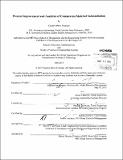Process improvement and analytics of commercial material substantiation
Author(s)
Freeman, Carolyn Marie
DownloadFull printable version (7.747Mb)
Other Contributors
Leaders for Global Operations Program.
Advisor
Bruce Cameron and Bradley Morrison.
Terms of use
Metadata
Show full item recordAbstract
Sikorsky is currently negotiating the SDTA proposal for the CH-53K helicopter. Due to the Truth In Negotiations Act (TINA), when submitting a proposal to the government all suppliers with a total award greater than $700,000 need to have supporting documentation (material substantiation) showing that pricing is fair and reasonable. This can be accomplished through competition, a cost-price analysis (CPA), or commerciality. Each entity involved in the proposal prefers a different substantiation method: the government prefers CPA or competition, the suppliers prefer commerciality, and Sikorsky prefers competition. Because the government and suppliers have opposing views on commerciality, the government has increased the oversight and complexity of the commercial process. Previously, a proposal's commerciality claims required only a commerciality claim form and an invoice showing that the part had been sold to a commercial entity, but did not require the supplier to provide the commercial invoice price. For the SDTA proposal, an approved commerciality claim required a commerciality form, non-redacted invoices showing pricing information and the customer to which the part was sold, an escalated price analysis to support price reasonableness, a detailed list of modifications to the commercial part, an estimated cost of the modifications, and final commercial end user information. The commercial process involved roughly 90 Sikorsky employees and required roughly 11 months to fulfill all of the government's SDTA commercial requirements. As a comparison, CPA substantiation was completed 4 months prior to commerciality. Reasons for the long cycle time include labor time, a lengthy paper internal approval process including process downtime, lost or misprocessed documents, and insufficient employee training. To combat these inefficiencies, a formalized commercial substantiation process that uses an electronic workspace to provide process control is proposed in this thesis. The formalized commercial substantiation process decreases the required labor hours by an estimated 43%, decreases the internal approval cycle time by 74%, and provides secure document management. These improvements not only benefit the company internally, but also provide external benefits like an increase in government satisfaction which will help Sikorsky attain additional government contracts.
Description
Thesis (M.B.A.)--Massachusetts Institute of Technology, Sloan School of Management; and, (S.M.)--Massachusetts Institute of Technology, Engineering Systems Division; in conjunction with the Leaders for Global Operations Program at MIT, 2013. Cataloged from PDF version of thesis. Includes bibliographical references (p. 55-56).
Date issued
2013Department
Leaders for Global Operations Program at MIT; Massachusetts Institute of Technology. Engineering Systems Division; Sloan School of ManagementPublisher
Massachusetts Institute of Technology
Keywords
Sloan School of Management., Engineering Systems Division., Leaders for Global Operations Program.